Meet Martin Luther: A man with conviction and a mission

It’s October in America. That means it’s time for college football, changing leaves, pumpkin picking, the universal denouncement of candy corn as a "trash candy," and the return of Spirit Halloween stores. But, for those of us in the Protestant tradition, October 31 is far more than just an excuse to put on costumes and eat so much candy that our blood sugar spikes like a football in the hands of Rob Gronkowski. In fact, if it wasn’t for what happened on an October 31 over 500 years ago, our Protestant tradition and heritage might not even exist at all.
So, as this month gets underway, I want to use this column to introduce you to a hero of the Christian faith — one of those towering giants of church history, on whose shoulders we stand today. That man is none other than Martin Luther.
Philip Melanchthon, Luther’s successor and faithful collaborator, claims it was on October 31, 1517, when Luther nailed his theological treatise protesting the sale of indulgences to the Wittenberg door. While popularly understood as an act of protest, what Luther meant to do was invite debate.
Luther’s original aim wasn’t revolt, but to initiate a conversation about the Catholic Church’s understanding of the doctrine of repentance.
And yet, if Helen of Troy was the "face that launched a thousand ships," then Luther’s 95 Theses was the "post that launched a thousand debates." Whether he intended to or not, with that hammer and nail on that fall day, Luther struck theological flint, sparking the Reformation and lighting what Puritan pastor Richard Sibbes called, "that fire which all the world shall never be able to quench."
Lightning strikes and changes the world
Born the son of a copper miner in Eisleben, Germany, Martin Luther was originally bound for a legal career. His father recognized his intelligence early on and invested in his education, hoping that his son would become a lawyer. Little did Hans Luther know that Martin’s heavenly Father had other plans for his son.
In 1505, a 21-year-old Martin was caught in a severe thunderstorm while journeying home from university on horseback. As the story goes, a lightning bolt struck the earth so close to Luther that it threw him from his horse. Upon hitting the ground, he feared his soul was about to violently depart this mortal coil. Gripped by the impending reality of facing God’s wrath and judgment, he cried out, "Help! Saint Anna, I will become a monk!"
Yet lightning would not be the end of Luther’s life that fateful afternoon. He survived the storm. And he kept his word — much to his father’s frustration. Off to the monastery, Martin went.
A monk in search of grace
Joining the Augustinian order, Luther became a Roman Catholic monk. During his time as a monk, he was increasingly tortured by the weight of his sins before a holy and righteous God. If Luther knew anything, he knew himself to be a sinner. And as a sinner, he was a man — a monk — in desperate search of grace. It’s been reported that Luther, so fearful of the wrath of God, would spend hours in confession on a daily basis.
It was Luther’s spiritual mentor, Johann von Staupitz, who consistently pushed Luther back to the Bible — and back to Christ — to find forgiveness and peace. Eventually, Luther came across Romans 1:17: "For in the gospel the righteousness of God is revealed — a righteousness that is by faith from first to last, just as it is written: ‘The righteous will live by faith.’'"
It was here, in the first chapter of Romans, that a lightning bolt finally did strike Luther. But instead of death, he found new life, uncovering the glorious doctrine of justification by faith alone. Luther remembers that, upon reading this verse, he “began to understand that the ‘justice of God’ meant justice by which the man lives through God’s gift, namely by faith: "Here I felt that I was altogether born again and entered paradise itself through open gates."
Thankfully, this soothing balm for Luther’s troubled soul, this recovery of the biblical teaching that forgiveness and salvation was the free gift of God — and not earned by human merit or the purchase of indulgences or via the Pope — didn’t remain some private doctrine for the man himself. No, Luther took this good news, this Gospel, and carried it far and wide. Thus, the message of salvation by grace alone, in Christ alone, through faith alone, found in Scripture alone, to God’s glory alone, would grow into the foundation (the five "Solas" of the Reformation) on which a global recovery of the Gospel and the vibrant Protestant tradition would be founded.
A man seized by the power of God’s Word
By questioning the method of securing God’s grace unto salvation in the life of a Christian, Luther — and subsequent Reformers — struck at the core of the entire Catholic religious and political system of the day. If sinners were made right by God on the basis of His free gift of grace — and that was able to be known by searching God’s Word alone — what need was there to participate in the costly and convoluted system of confession, penance, prayers, pilgrimages, and the purchase of indulgences? More significantly, what need was there for priests? Or, most shockingly, what need was there even for a Pope?
For Luther, the answer was clear: There wasn’t any. True power was found in God and God’s Word alone — both in the incarnate Word, Jesus Christ, and in the inspired Word, the Holy Scriptures. In answer to these questions above came the outburst of Reformation theology. Flowing from Luther, it carried on through Zwingli, Calvin, Simons, Tyndale, Cranmer, and others, ultimately birthing a new — Protestant — religious tradition and heritage.
Reaching the end of his life, Luther reflected on what he had, by God’s grace, accomplished. Unsurprisingly, he gave all the credit to the power of God working through His Word. He said: "All I have done is put forth, preach and write the Word of God, and apart from this I have done nothing … It is the Word that has done great things … I have done nothing; the Word has done and achieved everything."
"Here I Stand"
Almost four years after that fateful day when Luther nailed the 95 Theses to the Wittenberg Door, he found himself in the city of Worms. The journey from Wittenberg to Worms had indeed been a “walk through the valley of the shadow of death” for Luther. Now, he was about to meet Charles V, the Holy Roman Emperor, face to face, in order to defend his views. Expecting death as the inevitable outcome of the imminent proceedings, Luther said "Christ lives, and we shall enter Worms in spite of all the gates of hell."
During the debate, as Luther faced down the emperor during the Diet of Worms, he uttered these now-famous lines, known for their ringing courage and refusal to compromise the truth, no matter the cost:
"If, then, I am not convinced by proof from Holy Scripture, or by cogent reasons, if I am not satisfied by the very text I have cited, and if my judgment is not in this way brought into subjection to God’s word, I neither can nor will retract anything; for it cannot be either safe or honest for a Christian to speak against his conscience. Here I stand; I cannot do otherwise; God help me! Amen."
As a result of the Diet of Worms, Luther was officially excommunicated from the Catholic Church. There was no turning back. The rest of his life would be spent under the threat of harm from the Pope, often on the run, and all for the sake of standing for convictions grounded on God’s Word.
Throughout the hardships of his increasingly difficult life, Luther would find great comfort in his marriage to Katharina von Bora, a runaway nun. Breaking the tradition of monastic celibacy, Luther embraced life as a husband, father, and family man. His writings speak to his great love and affection for his wife, who, author Karen Marsh explains, "ran a buzzing household, supervised their six children, and hosted mobs of relations and theology students — all while she managed her brewery, vegetable garden and fish hatchery. It’s no wonder Martin utterly adored the woman. He warmly declared, ‘There is no more lovely, friendly, and charming relationship, communion, or company than a good marriage.’"
Where do we stand today?
In his brief booklet, Reformation: Yesterday, Today, and Tomorrow, Carl Trueman imagines, "To some, the idea of the Reformation of the 16th and 17th centuries could have anything to teach the church of today would be regarded as nonsense." Of course, Trueman disagrees with any such assessment, as he goes on to defend how the Reformation is indeed relevant for our current moment.
And if the Reformation is still needed today — and it is — then Martin Luther is certainly relevant as well.
All across the world, Christians are daily tempted to compromise on core beliefs. God’s Word is mocked, reviled, and dismissed. At best, the Bible is viewed as antiquated and irrelevant; at worst, as bigoted and backward. If you stand on God’s Word, the world will come for you.
Evangelicals aren’t immune to the pressure to recoil, or even recant, in the face of the culture’s swarming assault and disapproval. Yet against the gathering darkness, the life and example of Martin Luther shines as a historical beacon of hope, casting rays of confidence up through the ages. Even today, we can hear his defense — “Here I Stand!” — echoing down the corridors of history, helping us stand and face our own fights today.
So, where do we stand today? On the same Word that Luther stood. May we, as he, claim God’s Word as our final refuge. As our solid rock. Here we stand. We can do no other.
Originally published at the Standing for Freedom Center.
William Wolfe served as a senior official in the Trump administration, both as a deputy assistant secretary of defense at the Pentagon and a director of legislative affairs at the State Department. Prior to his service in the administration, Wolfe worked for Heritage Action for America, and as a congressional staffer for three different members of Congress, including the former Rep. Dave Brat. He has a B.A. in history from Covenant College, and is finishing his Masters of Divinity at The Southern Baptist Theological Seminary.



























